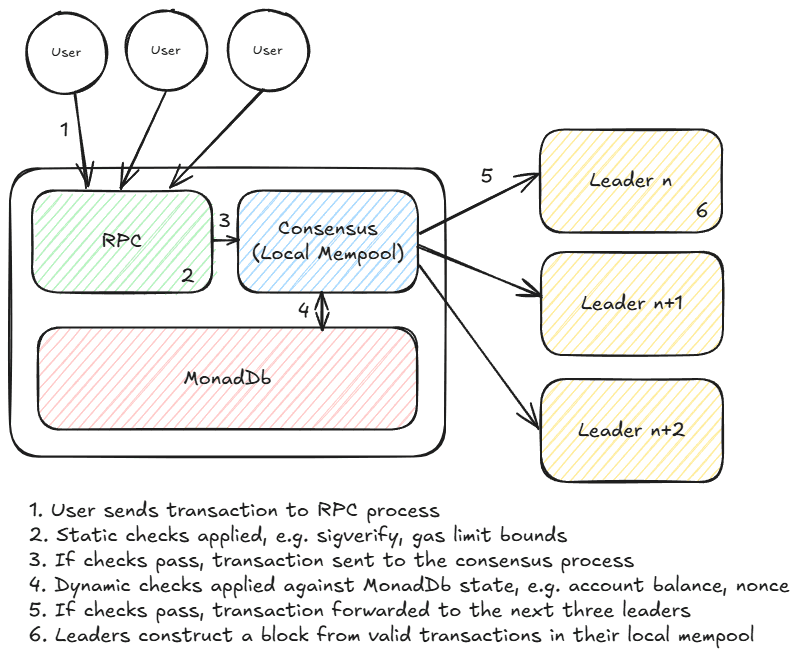Monad: Mempool
-
Most blockchains use a global mempool with peer-to-peer gossipping for transaction propagation.
-
This approach is not suitable for high performance distributed consensus for a few reasons:
- It is slow because it may involve many hops for a transaction to reach a leader increasing time to inclusion.
- It is wasteful on bandwidth because the gossip protocol involves many re-transmissions
- It ignores the leader schedule which is typically well known in advance.
-
In Monad, there is no global mempool; instead each validator maintains a local mempool, and RPC nodes forward transactions to the next few leaders for inclusion in their mempool.
-
This is much more efficient on bandwidth usage and allows transactions to be included more quickly
Background
- A mempool is a collection of pending transactions.
- Many blockchain networks use a global mempool design, using peer-to-peer gossip protocols to keepp roughly th same mempool state across all nodes in the network.
- A primary motivation of a global mempool design is that no matter who is leader, they will have access to the same set of pending transactions to include in the next block.
- A global mempool is effective for low-throughput networks, where network bandwidth is not a bottleneck.
- However, at thousands of transactions per second, the gossip protocols can easily consume the entire network bandwidth budget.
- Moreover a global mempool is wasteful since the ladder schedule is well nown in advance.
Transaction Lifecycle in Monad
- There is no global mempool in Monad.
- Validators maintian local mempools; RPC nodes forward transactions to upcoming leaders to ensure those transactions are available for inclusion.
- More precisely,
- A transaction is submitted to the RPC process of a node (typically a full non-validator node). We will call this node the "owner node" of the transaction, since it assumes the responsibility for communicating the status with the user.
- The RPC process performs some static checks on the transaction
- The RPC process passes the transaction to the consensus process
- The consensus process performs static checks and dynamic checks against local state in MonadDb, such as checking the sender's account balance and nonce.
- If the transaction is valid, the consensus process proces forwards the transaction to
Nupcoming leader validator nodes. - Currently,
Nis set to 3 in Monad Testnet. - Each of those
Nvalidators performs the same checks before inserting valid transactions into their mempools. - When it is a leader's turn to create a proposal, it selects transactions from its local mempool.
- The owner node of the transaction monitors for that transaction in subsequent blocks. If it does not see the transaction in the next
Nblocks, it will re-send to the nextNleaders. It repeats this behavior for a totalKtimes. CurrentlyKis set to 3 in Monad Testnet.
Local Mempool Eviction
- Transactions are evicted from a validator's local mempool for the following reasons:
- Whenever a validator finalizes a block, any replicas of transactions in that block are pruned from the local mempool
- Validators periodically check the validity of each transaction in the mempool and evict invalid transactions
- If the local mempools's size reaches a soft limit, older transactions are evicted.

